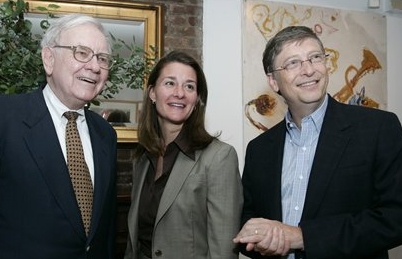Last month, 40 billionaires from around the United States announced that they had signed “The Giving Pledgecis,” an initiative started by Warren Buffett and Bill and Melinda Gates, stating their plans to donate the majority of their personal fortunes in their lifetime or after their death. Among the other signers are Star Wars director George Lucas, New York City Mayor Michael Bloomberg, and Texans T. Boone Pickens and Laura and John Arnold, who made their money through natural gas trading with John’s Houston-based hedge fund Centaurus Energy.
 Buffett says the pledge “is about asking wealthy families to have important conversations about their wealth and how it will be used.” If presented correctly, however, the pledge could also be a conversation that changes the debate on taxation in the United States.
Buffett says the pledge “is about asking wealthy families to have important conversations about their wealth and how it will be used.” If presented correctly, however, the pledge could also be a conversation that changes the debate on taxation in the United States.
Their timing was fitting, considering the day’s other news: U.S. Treasury Secretary Timothy Geithner said at the Center for American Progress that “America is a less equal country than it was 10 years ago,” in part because of former President Bush’s tax cuts for the super wealthy.
Geithner’s statement is undoubtedly true. A recent Institute for Policy Studies report concludes that, over the past 50 years, the brunt of this country’s tax burden has been shifted onto the middle class. Through tax cuts and write-offs, the super-wealthy have benefited from a “two-tier” tax structure: one for them and another for everybody else.
Another report issued last year reveals income inequality in this country is the worst it’s ever been. The report’s author, Benjamin Saez of the University of California at Berkeley, found that in 2007 alone the top 10th of one percent of American earners took home nearly 6 percent of all income.
And according to Lawrence Mishel at the Economic Policy Institute, a left-leaning research organization in Washington, D.C., the 400 American households with the highest incomes enjoyed a much faster pace of income growth than the vast majority between 1992 and 2007.
The pledge signers have made it clear that they want to make the world a better place in a big way. Their commitment leaves little doubt that this is more than a huge tax write-off. But maybe they could help us even more by talking more about what rich people shouldn’t be able to write off.
Or maybe they could just follow the lead of a group of wealthy Germans who recently volunteered to give more of their income to their country’s federal government. After all, as Mike Lapham of the Responsible Wealth Project at United for Fair Economy, points out, “A philanthropist might build a road … but philanthropy could never build and maintain the interstate highway system and state and city roads we all … depend on.” By voluntarily offering more, our American philanthropists could use this platform to advocate for humane federal tax policies across the board.
Buffett and Gates — staunch advocates of progressive taxation — could also help by reminding other billionaires of the responsibility that comes with wealth. Buffett’s outspoken support for higher taxes on the wealthy has, in the past, earned him the ire of some of his fellow billionaires. In 2007, for example, he blasted the U.S. tax system for being dramatically uneven. According to The Times of London, Buffett said that without avoiding higher taxes, he was taxed at 17.7 percent on $46 million in annual income, while his secretary was taxed 30 percent on $60,000. He has also testified before Congress on behalf of the recently expired estate tax. Meanwhile, Gates’ father, Bill Gates Sr., is leading an initiative to pass a personal income tax in Washington state for those making more than $200,000 a year.
In a time of political standstill, these billionaires could multiply their influence by adding to the debate on other progressive policy topics, like campaign finance reform in the wake of the Citizens United case and the restoration of a robust estate tax. Already, without Buffett or Gates, some of these billionaires have called on Congress to reinstate the estate tax, while another small group of millionaires wants the Bush tax cuts to expire.
In a recent poll, nearly 70 percent of Americans said they support campaign finance reform and nearly 88 percent oppose the Citizens United decision, which negated important limits on corporations’ campaign contributions. With many of these philanthropists also being major political donors and one (Bloomberg) a public officeholder, it’s time for them to raise their voices on behalf of the American public.
They earned their money — and this responsibility too.
James Russell is a Fort Worth resident who is currently interning with Truthout, a progressive online news organization.











